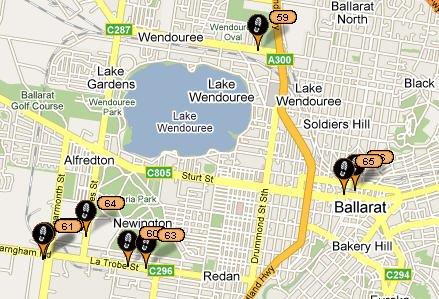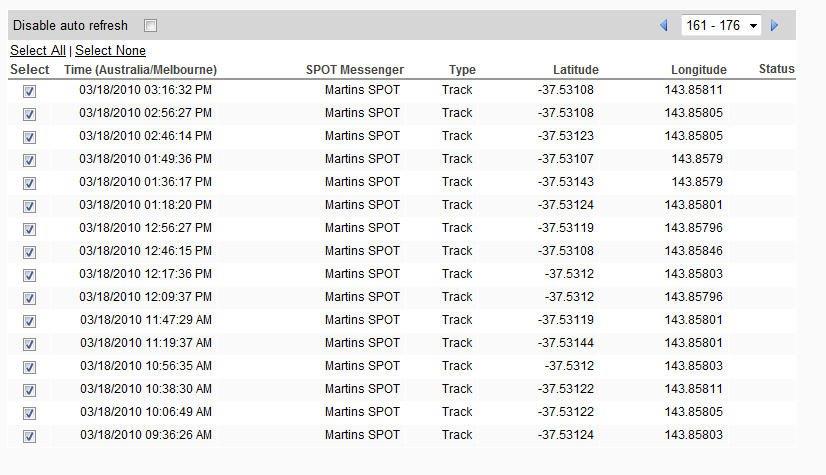Get yourself a **** (don't want to be accused of advertising but I only know one brand, search the web it has 4 letters) device - message me privately if wanted . Cheaper than an EPIRB by far (but not officially licensed as such but still activates emergency services) and sends a symbol of your position every 20 minutes to a web url and superimposes it on a map. My wife logs in at home and she looks at the trail of points and sees if I have moved recently (it keeps every point and its time and coordinate for up to 7 days, you programme how often you want it to send a message to the satellite and how long to retain points). She also sees a table with all the GPS coords of each point, and can dowmnload the coords as a CSV file for a spreadsheet programme. Has three buttons - emergency services and two programmable from my laptop - you can specify messages from these two go to any combination of miltiple SMS messages on phones or email. One I have saying that I am just checking in (5:30 pm each day), the other is more like ("delayed don't worry"). And if stuck you can re-programme a message, say, "three tyre casings ripped out - please let Bill on Blowfly bore station know but not SES or police yet". remember to turn off before visiting your girlfriend,,,,
I also have GPS, 4G blue tick mobile (Telstra's Dave and its latest equivalent are near-useless as batteries are only screw-in and if the user changes you void warranty - I like to change them once per day because of the apps I use, and I have never had 4G only 3Gg even in places with more than 100,000 people), HF, UHF, Satphone, Epirb (with flashing strobe light for night when working in forests), But news for you - one or more sometimes can't make a connection, and I routinely use the **** first. Deep valleys and tree cover are worst, but satphones often have intermittent reception (never had to activate an EPIRB). The *** comes with a belt connection so you can wear it as well when you leave vehicle, a couple of AAA lithiums give many days of use, fits in your shirt pocket and probably weighs 100 g without batteries.
Two other things re water. You probably know about digging a hole, putting a mug in the middle, piling spinifex around it, covering it with clear plastic and weighting it slightly with a pebble on the plastic above the cup (drip, drip). Or cutting a green branch and hanging it over a billy. Great ideas and better than nothing, but on a hot day in the outback you will need 5 litres per day simply to maintain life (not cook or wash although you can drink cooking water) after about the first day when you are really dehydrating. Drip, drip..... Mostly helps keeps outback survival instructors in business, but I woulkd do it if there was nothing else, every bit counts and I usually have a few mugs - but instead carry far more water than you need. I found that I only use about 5 litres or less for everything in cool weather - but that can be unpredictable and rare in the outback. If in doubt, turn back and get more while you can (same with fuel).
Radiator water - with most alloy heads you will have had anti-freeze put in your radiator water as routine (you may not know), it will killl you. Better to dig your own gnamma hole in a drainage (all hard work after dusk, as much travel as possible after dusk.
It can be cold in the desert (eg minus 19 recorded in Australia near Cloncurry), and minus 10 is not uncommon in the Victorian-NSW mountains. I have been snowed upon in the sand dune desert of Namibia, and in Iran, Afghanistan and Turkey - it also happens in Chile. Hypothermia is real, especially if you spent all day trying to dig out your vehicle from sand (if your mate goes all quiet in the cold and doesn't seem to make sense, get him bundled up in a blanket). Otherwise death follows at surprisingly higher temperatures than you might expect. If it is you, try and be aware of these signs before you can't think (i.e. not thinking too clearly).
Broken coil spring - jack up, cram a rubber boot in it - once got from Arkaroola to Adelaide that way.
Roof load - no problem eh? With water and fuel, stick it on the top in jerry cans plus some gas bottles etc? Except that recommended total roof load for a Pajero for example is only 75 kg, a roof basket for your jerry holders is probably at least 15 kg, a double jerry can holder at least 5 kg, perhaps 1.5 kg for an empty jerry. So four empty jerries already make up 15+10+6 = 31 kg. 20 litres of water is 20 kg, 20 litres of petrol is 14 kg. So 2 of each is another 68 kg and your roof load is already 99 kg, one third above recommended. My dealer says he ocasionally gets a couple of 100 kg guys asking for him to fit a 60 kg fold-out roof tent for sleeping on their 4x4 roof = 260 kg (three and a half times rated roof load). He has to try and fix the roofs..... There are other ways such as fitting a bar frame around and above your vehicle to take extras load, but everything adds to weight and provides places for branches to jam....
Doing stupid things for enough years teaches one well.....
I also have GPS, 4G blue tick mobile (Telstra's Dave and its latest equivalent are near-useless as batteries are only screw-in and if the user changes you void warranty - I like to change them once per day because of the apps I use, and I have never had 4G only 3Gg even in places with more than 100,000 people), HF, UHF, Satphone, Epirb (with flashing strobe light for night when working in forests), But news for you - one or more sometimes can't make a connection, and I routinely use the **** first. Deep valleys and tree cover are worst, but satphones often have intermittent reception (never had to activate an EPIRB). The *** comes with a belt connection so you can wear it as well when you leave vehicle, a couple of AAA lithiums give many days of use, fits in your shirt pocket and probably weighs 100 g without batteries.
Two other things re water. You probably know about digging a hole, putting a mug in the middle, piling spinifex around it, covering it with clear plastic and weighting it slightly with a pebble on the plastic above the cup (drip, drip). Or cutting a green branch and hanging it over a billy. Great ideas and better than nothing, but on a hot day in the outback you will need 5 litres per day simply to maintain life (not cook or wash although you can drink cooking water) after about the first day when you are really dehydrating. Drip, drip..... Mostly helps keeps outback survival instructors in business, but I woulkd do it if there was nothing else, every bit counts and I usually have a few mugs - but instead carry far more water than you need. I found that I only use about 5 litres or less for everything in cool weather - but that can be unpredictable and rare in the outback. If in doubt, turn back and get more while you can (same with fuel).
Radiator water - with most alloy heads you will have had anti-freeze put in your radiator water as routine (you may not know), it will killl you. Better to dig your own gnamma hole in a drainage (all hard work after dusk, as much travel as possible after dusk.
It can be cold in the desert (eg minus 19 recorded in Australia near Cloncurry), and minus 10 is not uncommon in the Victorian-NSW mountains. I have been snowed upon in the sand dune desert of Namibia, and in Iran, Afghanistan and Turkey - it also happens in Chile. Hypothermia is real, especially if you spent all day trying to dig out your vehicle from sand (if your mate goes all quiet in the cold and doesn't seem to make sense, get him bundled up in a blanket). Otherwise death follows at surprisingly higher temperatures than you might expect. If it is you, try and be aware of these signs before you can't think (i.e. not thinking too clearly).
Broken coil spring - jack up, cram a rubber boot in it - once got from Arkaroola to Adelaide that way.
Roof load - no problem eh? With water and fuel, stick it on the top in jerry cans plus some gas bottles etc? Except that recommended total roof load for a Pajero for example is only 75 kg, a roof basket for your jerry holders is probably at least 15 kg, a double jerry can holder at least 5 kg, perhaps 1.5 kg for an empty jerry. So four empty jerries already make up 15+10+6 = 31 kg. 20 litres of water is 20 kg, 20 litres of petrol is 14 kg. So 2 of each is another 68 kg and your roof load is already 99 kg, one third above recommended. My dealer says he ocasionally gets a couple of 100 kg guys asking for him to fit a 60 kg fold-out roof tent for sleeping on their 4x4 roof = 260 kg (three and a half times rated roof load). He has to try and fix the roofs..... There are other ways such as fitting a bar frame around and above your vehicle to take extras load, but everything adds to weight and provides places for branches to jam....
Doing stupid things for enough years teaches one well.....





